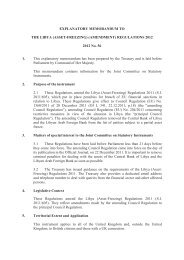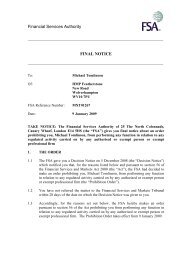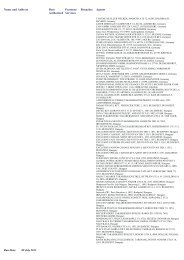FSA Annual Report 2006/07 - Better Regulation Ltd
FSA Annual Report 2006/07 - Better Regulation Ltd
FSA Annual Report 2006/07 - Better Regulation Ltd
Create successful ePaper yourself
Turn your PDF publications into a flip-book with our unique Google optimized e-Paper software.
Section one – Promoting efficient, orderly and fair markets<br />
<strong>FSA</strong> <strong>Annual</strong> <strong>Report</strong> <strong>2006</strong>/<strong>07</strong><br />
15<br />
Promoting efficient, orderly<br />
and fair markets<br />
Introduction<br />
Our work to promote efficient,<br />
orderly and fair markets affects both<br />
retail and wholesale firms. Our<br />
preference is for working with the<br />
industry to find solutions to market<br />
failures and to intervene only where<br />
the benefits of doing so are likely to<br />
outweigh the costs. During the last<br />
year this approach has led to success<br />
in two key areas – reducing<br />
confirmation backlogs in credit<br />
derivatives and achieving contract<br />
certainty in the general insurance<br />
market.<br />
Alongside our work with the<br />
industry to raise standards we have<br />
taken a robust approach to those<br />
who fail to meet our requirements.<br />
In particular, we have taken action<br />
against firms and individuals for<br />
breaches of our market conduct<br />
rules. To improve our effectiveness<br />
in preventing and detecting market<br />
abuse we have also made<br />
considerable investment in the<br />
development of our new transaction<br />
monitoring system, Sabre 2.<br />
We have also continued our work to<br />
influence the European and<br />
international agendas. We have<br />
spent a significant amount of time<br />
finalising our rules for the Markets<br />
in Financial Instruments Directive<br />
(MiFID) and preparing to implement<br />
the Capital Requirements Directive<br />
(CRD).<br />
Improving supervision<br />
Firms<br />
Following a period of significant<br />
growth in the trading of credit<br />
derivatives, in 2005 we identified<br />
large trade confirmation backlogs in<br />
firms. We worked closely with firms<br />
and with international regulators,<br />
including the Federal Reserve Bank<br />
of New York and the Securities and<br />
Exchanges Commission (SEC), to set<br />
targets and monitor progress in<br />
reducing trade confirmation<br />
backlogs. The industry has made<br />
significant progress. The number of<br />
credit derivative trade confirmations<br />
outstanding for more than 30 days<br />
had fallen by 90% as at 31 March<br />
20<strong>07</strong>. In November <strong>2006</strong> we<br />
broadened this initiative to address<br />
growing trade confirmation backlogs<br />
in equity derivatives and interest rate<br />
swaps. We asked firms to reduce by<br />
25% the number of equity derivative<br />
trade confirmations outstanding for<br />
more than 30 days; all firms had<br />
achieved this target by January<br />
20<strong>07</strong>. Eliminating such backlogs<br />
reduces legal uncertainty and<br />
operational risks and supports<br />
market stability.<br />
In December 2004 we asked the<br />
general insurance industry to find a<br />
solution to contract certainty in the<br />
UK by the end of <strong>2006</strong> or face<br />
regulatory intervention. In January<br />
20<strong>07</strong> we reported that the market<br />
had, at an aggregate level, delivered a<br />
solution; 90% of contracts in the<br />
subscription market and 88% in the<br />
non-subscription market were<br />
achieving contract certainty. This is a<br />
major achievement by the UK<br />
insurance industry and has resulted<br />
in a more efficient market for buyers,<br />
brokers and insurers, and brought<br />
competitive benefits to the UK.<br />
Since introducing our risk-based capital adequacy regime for insurers at<br />
the start of 2005, we have reviewed all the largest firms’ Individual Capital<br />
Assessments (ICAs) and are on course to complete the review of the ICAs<br />
of all other insurers by mid-20<strong>07</strong>. Our new regime has led to significant<br />
improvements in risk management and to the understanding of risk and<br />
capital issues by boards and senior management.<br />
In February 20<strong>07</strong> the Association of British Insurers (ABI), in partnership<br />
with other trade associations, published a guide to the ICA process for<br />
insurers. We worked closely with the trade associations to develop this<br />
guidance, which provides commentary and examples of how firms may<br />
achieve our objectives for ICAs.









